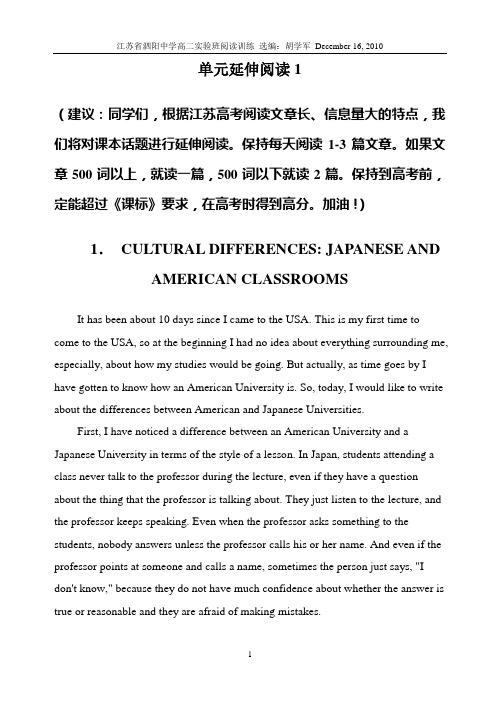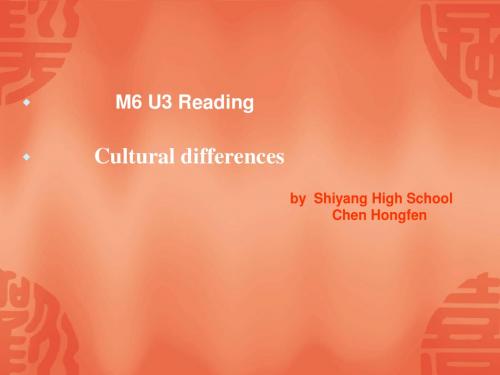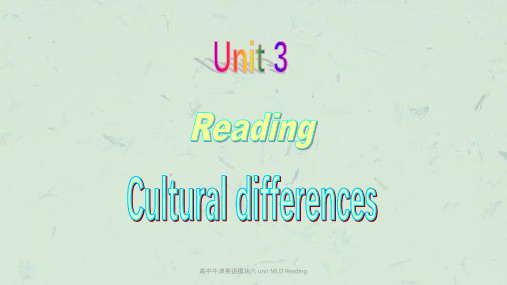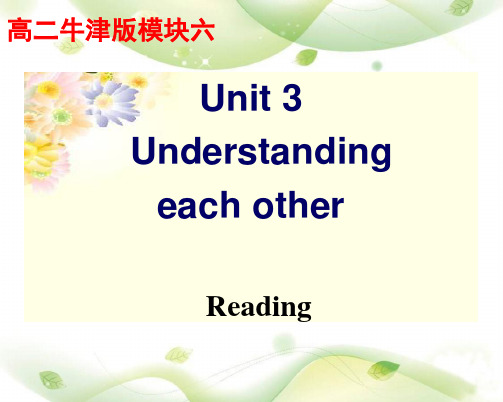高中牛津英语模块六 unit 3 M6U3 Reading
牛津高中英语单元补充阅读(Module6,Unit3)

单元延伸阅读1(建议:同学们,根据江苏高考阅读文章长、信息量大的特点,我们将对课本话题进行延伸阅读。
保持每天阅读1-3篇文章。
如果文章500词以上,就读一篇,500词以下就读2篇。
保持到高考前,定能超过《课标》要求,在高考时得到高分。
加油!)1.CULTURAL DIFFERENCES: JAPANESE ANDAMERICAN CLASSROOMSIt has been about 10 days since I came to the USA. This is my first time to come to the USA, so at the beginning I had no idea about everything surrounding me, especially, about how my studies would be going. But actually, as time goes by I have gotten to know how an American University is. So, today, I would like to write about the differences between American and Japanese Universities.First, I have noticed a difference between an American University and a Japanese University in terms of the style of a lesson. In Japan, students attending a class never talk to the professor during the lecture, even if they have a question about the thing that the professor is talking about. They just listen to the lecture, and the professor keeps speaking. Even when the professor asks something to the students, nobody answers unless the professor calls his or her name. And even if the professor points at someone and calls a name, sometimes the person just says, "Idon't know," because they do not have much confidence about whether the answer is true or reasonable and they are afraid of making mistakes.In contrast, in the USA, students attending a class often talk to the professor during the lecture whenever they have a question or they have an opinion. So, a professor in the USA sometimes has to stop the lecture to talk about or explain the thing asked by a student even during the lecture. When the professor asks something to the students, someone answers the question voluntarily, and someone else would answer the question if his or her answer is different from the first person. At that time I think the students don't worry about whether their answers are right or not, but they answer because something occurs to them.Secondly, I have noticed a difference between American and Japanese classrooms in terms of the relationship between teachers and students. In Japan, a professor is considered to be a person who teaches a particular subject. So, a teacher just teaches his or her professional thing to the students and never talks about private things to the students, even outside of class. We have to put a huge distance between ourselves and the teachers, and have to call them Professor Sato, for example. The professors call us also by our last names, with Mr. or Miss. (Some professors call the students' last names without Mr. or Miss.) So, we never talk about private matters with them. In this case, the private matters include daily stuff, such as our failure in a course or our part-time job, or whatever is being used in daily conversation. In contrast, in an American university a professor does teach, of course, their professional subjects, but they tend to talk about their personal matters to some extent, even in lessons. I have heard from some professors about how their husband or wife is and also about their daily affairs. Outside the class, the students talk to their professors about their lives, for example, when they meet in the cafeteria or snack bar. I mean they have a daily conversation with each other. Some students call their professors by their first names if the professor does not mind, and the professors always call the students by their first names, even in the classes.Thirdly, I have noticed a difference in regard to the classroom manners of both the students and teachers. In a classroom of a university in Japan, students have to be formal to show respect to a teacher. Drinking a soft drink or chewing gum during a lesson is considered to be bad manners. I would say a student who has his or her feet on a chair nearby would be told to leave the class. In contrast, American students do the things mentioned above, but unless they interrupt a lecture, they are not considered to be bad. As for the behavior of teachers in Japan, they always stand up during their lectures and never sit down. In contrast, in the USA, they sit down on a chair or even on a desk in the front of a classroom during lessons, although they sometimes stand up.Lastly, I have noticed a difference between American Universities and Japanese Universities in terms of the volume of homework or preparation for the next lesson. In Japan, few teachers request that students prepare for the next lesson or do homework. Even if they do, we do not, since we do not provoke conversation and the teacher can not find out if we have done it or not. In contrast, in an American University, the students are required to study hard to prepare for the next lessons in order to discuss particular things when the time comes. And also, teachers often ask the students to read certain books or to write reports due on a certain day. I would say these are homework. If the students ignore them, it is easily found out that they are lazy or unmotivated, and as a result of that they would get bad scores.I am thinking about these kinds of differences not because I am trying to judge which is better, but because I have felt the differences by facing the two of them. I would say the differences come from the cultural differences, not just from the differences in their educational systems. (911词)2. Custom in ThailandPeople live in Thailand have different culture and food from American people or another country. First of all, we have a great respect older people and parents. We listen to our parents and older people. When we go to school in the morning, we bow goodby to our parents and we comeback we do that again. We bow when we meet older people. We never shake hands or kiss other people. Close friends do touch one another when speaking. Superiors may also touch subordinates to show kindness or concerns. In Thailand, it is common to see friends of same sex hold hands. It indicates close friendship and nothing sexual in nature. Second, when we are speaking to someone, it is importance to make eye contact, physical contact, gestures, facial expressions. It is quite acceptable to gesticulate with hands while speaking. However, it is considered bad form to point an index finger at the person you speak to. Feet must not be used to gesticulate or point, since they are considered "low." Third, food is different. Thai cooking reflected the characteristics of a waterborne lifestyle. Aquatic animals, plants and herbs were major ingredients. Thai cooking methods were stewing and baking, or grilling. Thai meal is served all at once, permitting diners to enjoy complementary combinations of different tastes. A proper Thai meal should consist of a soup, a curry dish with condiments, a dip with accompanying fish and vegetables. A spiced salad may replace the curry dish. The soup can also be spicy, but the curry should be replaced by non spiced items. Thai meal is a harmonious blend of the spicy, the subtle, the sweet and sour, and is meant to be equally satisfying to eye, nose, and palate. In Thailand, we eat rice with food and our family eats every meal together. We do not eat fast food or go out to eat very often. In addition, Thai people are fun loving in nature. They are love having fun. We have different culture, but we are friendly to everybody.(343词)单元延伸阅读2(建议:同学们,根据江苏高考阅读文章长、信息量大的特点,我们将对课本话题进行延伸阅读。
高中牛津英语模块六 unit MU3 Readingppt课件

in Brunei?
4. How do people in Brunei point? Why?
5. What British festival are Peter’s
American friends not familiar with?
6. What kind of food do Brits eat at this
n. (在室外为庆祝而燃起
的)大火堆,篝火
adj. 通晓;熟悉
n. 庆典;庆祝活动
n. 焰火,烟花
n. 热狗(香肠面包)
n. 芥末;芥末酱
n. 户外烧烤
4
Do you remember the culture differences in different countries?
5
Eating
6
n. 招待会;接待;接受
n. 新郎
n. 新娘
2
Words review
permit
prohibit throughout
offence *thumb
adjust
accustomed *Brit
vt.&vi.允许,准许
n. 许可证
vt.(尤指以法令)禁止
prep.&adv. 自始至终;贯穿
整个时期;各处,遍及
11
Skimming to get
general many people are involved in this dialogue? who are they? Where do they come from? Three people: Ma Li, China; Waled, Brunei; and Peter, the UK.
M6,U3,reading

The text can be divided into four parts:
PartⅠ: Line1-Line12 Ⅰ PartⅡ: Line13-Line22 Ⅱ PartⅢ: Line23-Line40 Ⅲ PartⅣ: Line41-Line59 Ⅳ
Detailed Reading Ⅰ
Part Ⅰ (Line1-Line13)
In Brunei, at wedding receptions, men and women have to sit in separate areas—the men with the (6)___________ and the women with (7)____ .Food, bridegroom bride soft drinks, tea and coffee are served, but alcohol is not permitted . In Brunei, people use thumb to point. It’s funny to watch a foreigner trying to (8)_____ _____ doing that. adjust to And people have to take off their shoes before entering someone’s house. Many foreigners have trouble (9)_______ accustomed ____ it. getting ___________ to In the UK, people have a festival—Bonfire Night, but Americans are not familiar with it. During the festival , there are large fires and fireworks. There are parties and people eat(10) ____ dogs and other food hot ____ cooked over the fire.
高中牛津英语模块六 unit MU3 Reading课件

in Brunei?
4. How do people in Brunei point? Why?
5. What British festival are Peter’s
高中牛津英语模块六 unit MU3 Reading
Skimming to get
general ideas
高中牛津英语模块六 unit MU3 Reading
1. How many people are involved in this dialogue? who are they? Where do they come from? Three people: Ma Li, China; Waled, Brunei; and Peter, the UK.
hen is the polite time to open
a present? Why?
2. What surprised Peter about the wedding
ceremony in Korea?
3. What drink is not permitted at a wedding
Festival
Spring Festival
Thanksgiving Day
Halloween
Christmas Day 高中牛津英语模块六 unit MU3 Reading
eating
clothes
Culture differences
wedding
Do you want to get more finesftoivramlsation about gCrueelttiunrgal differences? Now read the passage.
高中牛津英语模块六 unit 3 M6U3 Reading

*Brunei end-of-term wedding *Korea rooster ensure congratulate reception bridegroom bride n. 文莱 n. 学期末 n. 婚礼 n. 韩国;朝鲜 n. 公鸡 vt. 保证,担保,确保 vt. 向(某人)道贺,祝贺 n. 招待会;接待;接受 n. 新郎 n. 新娘
1.如果你再试一下也许你就会成功。 If you tried again, you might succeed. 2. 我要是知道她的电话号码,我就会给他打电 话。 If I knew her number, I could ring her up. 3.她可以自由出入她想去的地方,随意做她想 做的事。 She was free to go to where she liked and do what she liked .
Answer the following questions. p36C2 1.In the West, when is the polite time to open a present? Why? 2. What surprised Peter about the wedding ceremony in Korea? 3. What drink is not permitted at a wedding in Brunei? 4. How do people in Brunei point? Why? 5. What British festival are Peter’s American friends not familiar with? 6. What kind of food do Brits eat at this festival?
译林牛津版高中英语Module 6 Unit 3 reading I---cultural differences教学课件(共60张PPT)

Shoes
Should take off your shoes before going into
someone’s house
Fill in the blanks
Mali has to do her homework
on_c_u_l_tu__r_a_l differences. So she goes
My savings are accumulating interest.
(2) n. accumulation accumulation of knowledge
(1)accumulate v.往往指一点一
点地连续积累 只有通过努力工作,你才能积蓄一大 笔财富。
Only by working hard may you accumulate a big fortune.
Brainstorming:
1. Do you know something about different cultures in some foreign countries?
2. Are you confused about their behavior?
3. How can we overcome these cultural obstacles?
Brunei Men and women sit in a
different area;
No alcohol is available.
About Brunei
Wedding /
Pointing Using their thumb to point to others while others use first finger Clothes Shouldn’t wear yellow
牛津高中英语M6U3 Cultural differences Welcome+Reading
Detailed reading:
Menu
4
weddings shoes
USA/UK cultural 1 differences an American 2 celebration
6
7
3 5
presents pointing
color of clothing
Thanksgiving: line 1-18
the USA
do the same
If not, rude,strange to see the receiver’s reaction
Menu
4
weddings shoes
USA/UK cultural 1 differences an American 2 celebration
6
7
3 5
presents pointing
6
color of clothing
Ø we could use examples to explain
concepts and ideas. Ø Sometimes we use examples to support arguments Ø sometimes they are used as interesting stories.
however in Brunei
line:49-51
They use:
thumb
Menu
4
weddings shoes
USA/UK cultural 1 differences an American 2 celebration
6
7
3 5
presents pointing
color of clothing
牛津译林 模块六第三单元 M6U3 Reading
整理版ppt
3
The Spring Festival
整理版ppt
4
Thanksgiving Day
整理版ppt
5
Chris整理t版mpptas Day
6
Discussion
Originally, Christmas Day was not celebrated by Chinese people. However, more and more Chinese young people are crazy about this festival and they spend a lot of time and money on it. Do you support this move? Why?
整理版ppt
28
2. What surprised Peter about the wedding
ceremony in Korea?
He was surprised by the live hen and
rooster as a part of the wedding
ceremony in Korea.
first finger = fore finger = index finger 意为“食指”。 大拇指 thumb 中指 middle finger/ long finger 无名指 ring finger/ the fourth finger 小指 little finger
But my American friends are not familiar with the particular festival. (P35)
牛津译林版高中英语选修模块六 Module6 Unit3 Reading教案-新版
Module6 Unit3 Reading教案Objectives:1.To help Ss get a general idea about the text.2. To make Ss become familiar with the detailed information about the text.3. To help Ss master Reading Strategy.Teaching important points:1.How to make the students understand the passage better.2.How to help the students finish all the exercises.3.How to help the students develop their creative, comprehensive and consolidating abilities.Teaching aids: multimedia and blackboardInteraction Patterns: Teachers -class, individuals, pairsProcedures for teaching:Step 1: Lead-inMany people like chatting on line, especially you students. You must have many e-pals.What do you think of online chat?Do you think it is really a good way to know more things and make more friends?Have you ever experienced any funny things or awkward situations when chatting with your cyber friends?Now, we will read an Internet chat room conversation. Surely you will know all about these after you read it. Sometimes online chat does benefit us a lot.Step 2: Fast reading for general ideasGo through the passage as quickly as possible and try to find answers to the three questions in part A on Page34. Just focus on and identify the information needed to answer these questions.Step 3: Detailed reading for important information.1. Let’s read the passage again and complete Parts C1 and C2 on page 36.2. Turkey.3. In the West, the polite time to open a present is when someone gives it to a person, because they like to see the person’s reaction.4. Guests expect presents as a souvenir to remember the big day.5. Alcohol.6. In Brunel, you should use your thumb to point at things.7. In both places, you should take off your shoes before going inside a house.C2 4 7 3 1 2 6 5Step 4: Practice1. Let’s complete Part D (Re fer to the text while complete part D)AnswersD 1d 2c 3f 4g 5b 6e 7h 8a2. Now, let’s read Ma Li’s diary about her chat room discussion. Fill in blanks with correct words.E 1)traditions 2)Thanksgiving 3)harvest 4)Europe 5)celebrate6)weddings 7)embarrassing 8) presents 9)rude 10) thumbStep 5: Post-reading activities1. Now let’s make up a dialogue by using the questions in Part F on Page 37. Work in pairs for a few minutes and then present your dialogue to the whole class.2. There are also cultural differences in different English-speaking countries. For example:Americans enjoy a good sense of humour; the British take a somewhat different view and believe a formal approach is the best way; the Australians are more informal and straightforward, often enjoying a good laugh and calling their close friends or new acquaintances by their first names.1.Discussion:What might happen if people had no idea of other countries’cultures?Do you think it might result in embarrassment on inconvenience?What do you think about “culture shock”?2.Do you know more information about cultural differences?➢In most countries, nodding your head up and down means ‘yes’.➢In some parts of Greece and Turkey, however, this motion can mean ‘no’.➢In South-eas t Asia, nodding your head is a polite way of saying ‘I’ve heard you.’➢In the United Stated, when someone puts his thumb up, it means ‘Everything is all right.’ However, in Sardinia of Italy and Greece, the gesture is insulting and should not be used there.Step 6:Language PointsStep 7: Homework1. Finish Parts A1 and A2 on page116 in the workbook.2. Prepare the part Word Power.。
牛津英语M6U3Reading课件
The rhetorical devices in the text
Rhetorical question
Metaphor
Simile
A question that is asked to make a point or to persuade. For example: "Isn't it obvious that we need to do something about climate change?"
The author of the text is a well-known English writer who has published numerous books and won numerous awards for her work.
The author's work has been translated into many languages and is popular worldwide.
Themes and motifs
Instruct students to identify and analyze the themes and motifs present in the text, such as love, loss, redemption, or nature. They should consider how these themes are developed and explored throughout the story.
A figure of speech that compares two different things without using the word "like" or "as". For example: "The ocean is the heart of our planet, pumping life throughout the world."
- 1、下载文档前请自行甄别文档内容的完整性,平台不提供额外的编辑、内容补充、找答案等附加服务。
- 2、"仅部分预览"的文档,不可在线预览部分如存在完整性等问题,可反馈申请退款(可完整预览的文档不适用该条件!)。
- 3、如文档侵犯您的权益,请联系客服反馈,我们会尽快为您处理(人工客服工作时间:9:00-18:30)。
Skimming to get general ideas
1. How many people are involved in this dialogue? who are they? Where do they come from? Three people: Ma Li, China; Waled, Brunei; and Peter, the UK. 2. How is the passage mainly organized? A. in order of time B. by giving examples C. by giving definitions D. by offering statistics
For example
1.与现在事实相反的虚拟条件句: If it were not raining, we should go for a picnic. 如果现在不下雨的话,我们就出去野餐了。 (事实是:天在下雨,我们不能出去野餐。) 2.与过去事实相反的虚拟条件句: If she hadn't called me, I would have overslept this morning. 今天早上,她要是不叫我的话,我就会睡过头了。 (事实是:她今天早上叫我了,我没有睡过头。) 3.与将来事实相反的虚拟条件句: If I were to be twenty years old next year, I would take the course of French. 明年我要是二十岁,我就会学法语。 (事实是:我现在已经老了,明年我学不了法语了。)
p36C1
1. In Korea, it is believed that roosters hens can drive bad spirits away from the wedding ceremony. 2. The bridegroom and bride have to sit in different areas at the wedding reception in Brunei. 3. People in Brunei celebrate the wedding by singing playing and louddancing drums throughout the night. 4. In Brunei the UK, people take off their shoes before entering someone’s house. 5. There can be great cultural differences even between people who speak the same language.
Answer the following questions. p36C2 1.In the West, when is the polite time to open a present? Why? 2. What surprised Peter about the wedding ceremony in Korea? 3. What drink is not permitted at a wedding in Brunei? 4. How do people in Brunei point? Why? 5. What British festival are Peter’s American friends not familiar with? 6. What kind of food do Brits eat at this festival?
2. Roosters are supposed to drive bad spirits away from the wedding ceremony, and hens are thought to ensure good luck for the marriage. and连接的两个分句
(sb. / sth.) be supposed / thought / expected to do sth.相当于It is supposed / thought / expected that (sb. / sth.) …应该;认为必须;被期望 These batteries are supposed to last for a year.这 些电池应该能用一年。 公鸡被认为是用来辟邪的,而母鸡则被 The chest was thought to contain gold. 认为能给婚姻带来好运。 那匣子被认为装有金子。 Borrowers are expected to return books on time. 借书的人应该准时还书。
Words review permit prohibit throughout offence *thumb adjust vt.&vi.允许,准许 n. 许可证 vt.(尤指以法令)禁止 prep.&adv. 自始至终;贯穿 整个时期;各处,遍及 n. 冒犯;侮辱 n. 拇指 vi.&vt.适应,习惯;调整, 调节 adj. 习惯于;惯常的 n. 英国人
1.如果你再试一下也许你就会成功。 If you tried again, you might succeed. 2. 我要是知道她的电话号码,我就会给他打电 话。 If I knew her number, I could ring her up. 3.她可以自由出入她想去的地方,随意做她想 做的事。 She was free to go to where she liked and do what she liked .
Pick out the examples mentioned. √
√ √ √ √
Bonfire Night eye contact opening presents wedding traditions table manners gesture of pointing shoes color of clothing greetings
familiar celebration firework hot dog mustard barbecue
Do you remember the
culture differences in
different countries?
Eating
Wedding customs
Clothing
Greeting
accustomed *Brit
Words review
alike adj. 想像,十分相似 adv. 十分想像地;同样地 n. (在室外为庆祝而燃起 的)大火堆,篝火 adj. 通晓;熟悉 n. 庆典;庆祝活动 n. 焰火,烟花 n. 热狗(香肠面包) n. 芥末;芥末酱 n. 户外烧烤
*bonfire
Festival
Spring Festival Thanksgiving Day
Halloween
Christmas Day
eating clothes Culture differences wedding
Do you want to get more festivals information about greeting Cultural differences? Now read the passage.
Now check the answers. p36C2 1. In the West, when is the polite time to open a present? Why? You should open a present when you receive it, because people want to see how you react. 2. What surprised Peter about the wedding ceremony in Korea? He was surprised by the live hen and rooster as a part of the wedding ceremony in Korea. 3. What drink is not permitted at a wedding in Brunei? Alcohol is not permitted.
the reading part. ensure good luck for · Having a live hen to _______
Brunei
重难点句子分析
用来表示说话人所说的话不是一个事 实,而是一种假设、猜测、怀疑等。
虚拟语气
1.And you probably wouldn’t get much sleep if you lived near where a wedding reception was being held. 介词+宾语从句
Country
Customs __________ You should open the present immediately when you ________ receive it. Celebrating · ____________it on Nov. 5th Britain · Lighting large fire outside Bonfire · Gathering around to have a party Night cooked · Eating hot dogs according and other food _______ over Complete the form to the fire Korea Wedding the marriage and a rooster to drive bad ceremony spirits away laying an egg lucky ·Considering the hen’s _______ Separating men from women— the men · ___________ with the bridegroom, and the women with Wedding the bride reception · ________ __________ Prohibiting alcohol completely · Playing loud drums to celebrate the wedding whole night for hours or even the ______
